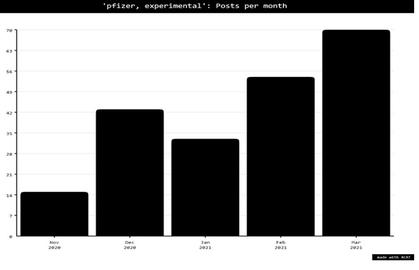This article is part of IranWire's ongoing coverage of Covid-19 disinformation in different countries, in partnership with Health Studio.
By Katherine Hignett for Health Studio
The Pfizer-BioNtech vaccine was the first Covid-19 vaccine to be approved by a national medicines regulator in December last year. Since then tens of millions of people have safely received the shot around the world.
But alongside the good news, disinformation about the jab has also flourished. Recent analysis of social networks by anti-disinformation organisation First Draft has shown fake news about the vaccine has spiked in line with positive announcements. And much of that disinformation, it seems, is being fuelled by pro-Russian networks.
Tracking Anti-Vaccine Narratives
The First News team used online forum analysis tool 4CAT to scour fringe social media platforms 4chan and 8kun, as well as niche conspiracy-based message boards on Reddit. These websites are sometimes the launch-pad for fake news stories and memes that go on to find audiences on more widely-used platforms.
The researchers discovered that mentions of “Pfizer” increased markedly in November last year, when the company announced successful clinical trial data for its vaccine, and in December, when the US started rolling out the jab.
Analysis of the most commonly-used words and phrases in posts that mentioned “Pfizer” showed an undercurrent of disinformation circulating on the platforms. A prominent theme was the baseless suggestion that the jab had been rushed out and hadn’t been properly tested.
A search for posts containing “Pfizer” and “experimental” between July 2020 and January 2021 revealed these narratives also began to take off on the platforms after the trial announcement. They surged again after regulatory approval was granted for the vaccine in a number of countries in December.
Looking just at 4chan, Health Studio found mentions of “Pfizer” and “experimental” have continued to appear in posts on the platform more recently. They appeared particularly frequently in March, when reports first began to emerge of a potential link between the Oxford-AstraZeneca vaccine and extremely rare blood clots.
Health authorities have since confirmed the jab is safe, but some countries are only giving it to people in certain age groups to further reduce what is thought to be an incredibly small risk.

A graph shows increases in use of the words “Pfizer” and “experimental” over several months.
Word trees highlighting common words in posts mentioning “Pfizer” from January to the end of March reveal disinformation narratives continue to spread on the platform.
Baseless claims that Pfizer’s vaccine can cause sterilisation are a common disinformation narrative. The vaccine is very safe and, as this February article from medical journal Nature explains, it has not been directly linked to any deaths.

Word trees highlight some of the most commonly-used words in posts about the Pfizer vaccine.
The word ‘useless’ appears twice on the word tree, suggesting some 4chan posts dispute the vaccine’s effectiveness. Rigorous clinical trials and real-world data have found the shot to be highly effective at preventing Covid-19.
Where do Pro-Russian Actors Come In?
For the best part of a year, the Kremlin has been accused of spreading fake news about Western Covid-19 vaccines in an effort to promote its own vaccine and to sow discord in other countries.
The First Draft team found evidence that pro-Russian networks were systematically disseminating disinformation online.
Their analysis revealed almost a third of URLs in 8kun posts mentioning ‘Pfizer’ and ‘experimental’ linked to disinformation websites NaturalNews and Zero Hedge, the latter of which is known for pushing pro-Kremlin narratives. Seb Cubbon, who authored the report, wrote that both websites often recycle each others’ content, as well as producing their own material.
In addition, First Draft found numerous links to Russian state-sponsored outlets and “proxy” sites wholly focused on pro-Kremlin disinformation narratives about the Pfizer vaccine.
“Proxy” websites post slightly altered versions of articles published by other pages thought to be directly linked to Russian intelligence agencies. They can amplify this content while obscuring its original source.
This artificial amplification, Cubbon tells Health Studio, is “a defining feature” of these websites, some of which simply duplicate or syndicate content, while others make small tweaks to the wording, publication dates and images.
Some websites even translate the articles into other languages before republishing it again. “Sometimes they'll use very slightly different wording, again to create these new artificial versions,” Cubbon says. “As a result of that, the same story [is published], but under very different appearances. Then it turns out there are dozens of versions of that story.”
These dissemination techniques can make an article seem more legitimate. “The fact that there are so many versions can give that illusion of credibility,” Cubbon adds. “You know, you're just reading online, you're flicking through your social media, and you see multiple reports of the same thing. That sometimes that can encourage people to think, wow, this is real, this is a big deal, this is credible.”
It’s important to note that many discussions on 4chan, 8kun and even some Reddit boards remain on the platform and do not necessarily spread onto more mainstream social media platforms.
But some posts — and the disinformation contained within them — end up being disseminated far more widely. On Facebook, for example, bad actors can instantly share misleading and false information to big public groups. “It becomes incredibly simple to spread this content and reach potentially a large audience.”
First Draft found examples of links to proxy websites posted by individual accounts to multiple Facebook groups in a matter of seconds: a technique known as “spree-posting.”
Similar amplification techniques were used to boost content from the disinformation website NaturalNews, links to which are banned on many social media platforms including Facebook. But last year, a report from the Institute for Strategic Dialogue found links to NaturalNews content could still end up on Facebook when hosted on other domains.
How to Protect Yourself Online
Disinformation can be hard to identify, particularly when lots of articles appear to support the same narrative. Cubbon says it’s really important to check the source of stories to work out how reliable they are. If you see a link in a social media post, for example, look at the name of the website it’s published on. “Try and work out, who is behind this website? What do they do? How credible are they?”
Even just googling the name of the website can be revealing, he adds. Lots of organisations evaluate online news publications and provide “trustworthiness” ratings. These can quickly show you how generally reliable a source is considered. Websites known to spread false news will often be flagged as such by these ratings sites.
Another thing to look out for, he says, are headlines that aren’t easily verifiable. Websites may host several articles that are hard to individually fact-check, but that contribute to a wider misleading narrative. Such articles may contain general anti-vaccination sentiments, for example, rather than quote specific statistics or specific individuals that can be verified.
“Some articles and messages...won't be necessarily factually inaccurate,” Cubbon says. “And so users might not naturally think that specific claim might be false.”
This makes it all the more important, he says, to find out what you can about the source of an article before you trust it. “And the first step of that,” he says, “can be a quick Google search.”
visit the accountability section
In this section of Iran Wire, you can contact the officials and launch your campaign for various problems


























comments